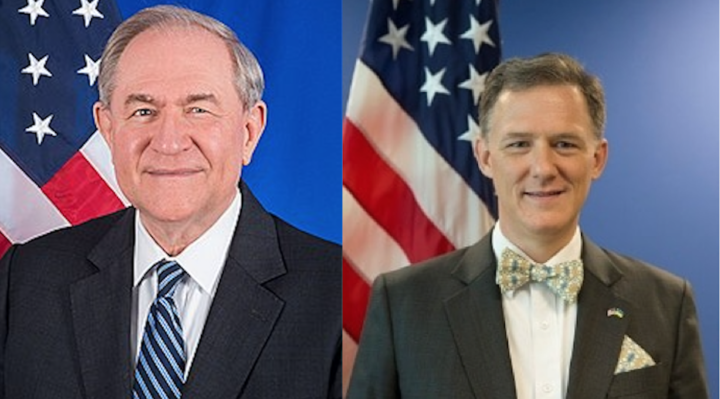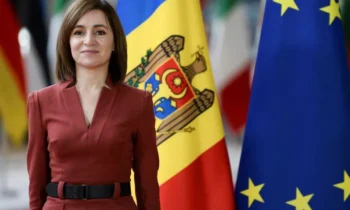“Massive” rights abuses and torture in Belarus have been condemned by an election-monitoring organisation with calls for a rerun of the country’s August presidential polls in which President Alexander Lukashenko claimed victory.
A report looking into the election and subsequent crackdown by authorities, published by the Organization for Security and Co-operation in Europe (OSCE) on Thursday, said human rights abuses “were found to be massive and systematic and proven beyond doubt”.

The United States Mission to the OSCE has been talking to Belarus all year about trying to do a joint ministerial decision and a joint program on trafficking in persons. We think that this is a way to really help people who are victims in Europe of human trafficking. And Belarus and the United States have been talking about this for a long time, and there’s no reason why we can’t find ways to work together with a country without tolerating the horrible misbehavior that is going on. Let’s clean up the misbehaviour, do constructive things, and then work together for a better Europe and Asia said Ambassador James Gilmore III U.S. Ambassador to the Organization for Security and Cooperation in Europe (OSCE).
Below is a full rush transcript of the press conference by Ambassador James “Jim” Gilmore III U.S. Ambassador to the Organization for Security and Cooperation in Europe (OSCE) And George Kent Deputy Assistant Secretary, Bureau of European and Eurasian Affairs, U.S. Department of State.
Ambassador Gilmore: I am the United States Ambassador to the Organization for Security and Cooperation in Europe. As the listeners on the line know, that organization is headquartered in Vienna, Austria, and I am speaking to you today from Vienna, Austria. It’s now 3:00 p.m. Vienna time. I’m joined on the call by George Kent, a Deputy Assistant Secretary of State, and we’re looking forward to an opportunity to answer your questions and give you a sense of what has happened in this important, news-worthy event.
On September 17 of this year, of last year, the United States joined 16 other states of the OSCE in invoking the Moscow Mechanism. This is a move that has precedence within the rules of the OSCE. It gives the member-states an opportunity to invoke an independent investigation. This happened, of course, because of the reports of the terrible abuses and the election violations and the fraudulent election which took place in Belarus, and then the substantial human rights violations that have occurred after that. So this is invoking an independent investigator to look into the serious allegations of human rights abuses in Belarus.
The mandate provided was a pretty substantial mandate. It reflected the scope and severity of the human rights violations. Yesterday, on November the 5th, the report was made public, and you can find that on the OSCE webpage, osce.org. It’s an extensive and thorough investigation of what happened in Belarus and what is going on right now, and it’s perfectly clear from the findings of the Moscow Mechanism report that everybody had a right to be concerned.
The report from the Mechanism rapporteur is an exceptionally well-documented report. It’s – the independent investigator, he was denied the ability to go to Belarus but he did have plenty of information and witnesses and people that he could speak to about the reality of what happens. And the report finds that on August 9th, the presidential elections in Belarus were, quote, “neither free nor fair” and that the Belarus authorities have engaged in sustained and systematic violations and abuses of the human rights and fundamental freedoms of the Belarusian people.
Now, the report is pretty detailed and it’s frankly very shocking that this kind of behavior would happen in a country on the European continent in the 21st century. And these abuses are – have credible reports of torture, arbitrary detention on a mass scale, expansive restrictions on the rights of peaceful assembly and freedoms of expression and association. In fact, the report is very detailed about the threats against people, women being threatened with rape, threatened – the family members being threatened that their children would be taken away, physical abuse, attacks on people, people putting – throwing people into prison in inhumane conditions, all for the purpose of trying to discourage the development of legitimate democracy in Belarus at this point.
The U.S. is going to continue to work with our European partners and keep a spotlight on this, on the ongoing human rights abuses in Belarus. Now, just a few hours ago, I joined several European OSCE ambassadors and met with the Belarusian opposition leader in exile Sviatlana Tsikhanouskaya. She is here in Vienna and met with several countries that are very prominent in the invoking of the Moscow Mechanism.
Now, Sviatlana provided a firsthand account of the abuses that people are suffering. The United States is going to continue to support the Belarusian people as they press for their voices to be heard and for their rights to be respected, including their demands for free and fair elections, which is fundamental on the European and Eurasian continent in the 21st century. Free and fair elections under international observation and the release of all political prisoners, stealing away and abducting political prisoners without charge and without a legitimate, real law to support it, is an act of domestic terrorism which is intended to try to clamp down on the emerging democracy in a place like Belarus.
DAS Kent: Thank you, Ambassador. And since this is a week of elections, I can also say, Governor, having proudly voted for Governor Gilmore back when he ran for my governor of my state of Virginia.
Our policy towards Belarus – to sort of put the context of what Ambassador Gilmore just shared related to the Moscow Mechanism report and the findings therein, the U.S. policy towards Belarus is to support a sovereign, independent, prosperous, and democratic country, and that hasn’t changed. We believe that the Belarusian people deserve the right that is guaranteed to them in their own constitution, the founding principles of the OSCE, the Helsinki Final Act, and the UN Charter: to choose their leaders in a free and fair election, subject to independent observation.
The United States supports the aspirations of the Belarusian people and the principles that are contained within the Helsinki Final Act, and that includes – and our programs and policies towards Belarus are based on that. That would include a free and independent media; support and assistance to Belarusians who have been forced to flee abroad to escape the persecution that Ambassador Gilmore and the Moscow Mechanism report detailed; as well as the development of an independent and thriving society.
When there are abuses, such as the ones that the report details, the U.S. works with partner and allied countries to hold those who violate fundamental human rights and undermine the integrity of elections to account, and that includes by sanctioning those individuals. And the U.S. as well as other countries have added a series of names to sanctions to try to show that we take those founding principles seriously.
At the same time, we continue to call for dialogue between Belarusians, and this also a recommendation in the report, but this has been our policy from the very beginning. Ultimately, while we’re all concerned about what happens in Belarus, the fate of Belarus should be determined by Belarusians, not by outsiders. And as U.S. officials have said repeatedly over the last several months, Belarus is for Belarusians to decide. This is not an issue between East and West. It’s not an area of competition between the United States and Russia. This is for Belarusians to decide. We believe that the OSCE has a role to play in fostering and facilitating a dialogue, but really, that needs to be a dialogue between Belarusians.
Question: First is to Deputy Assistant Secretary Kent. I remember that last year it was a very well serious effort to establish better relations with Belarus for a year but for at least two and a half years, and you were with Mr. Kravchenko at the same table. So do you think that the U.S., USA still will send an ambassador to Belarus or this process will be halted for some time?
There are a great scale of human rights abuses, and some people in human rights organizations say that Europe and the United States, not enough sanctioning Lukashenko for that. Do you expect any new sanctions towards the regime?
DAS Kent: President Trump nominated a career diplomat, Julie Fisher, a friend and colleague, to be our first ambassador in Belarus since 2008, when Lukashenko sent our ambassador home and reduced the size of our mission. Julie Fisher received a positive vote out of the Senate Foreign Relations Committee, but under our system, there has to be a full vote of the U.S. Senate and that final conformation vote has not yet been scheduled.
So the – we are still waiting and hoping that the Senate will confirm the nomination of Julie Fisher, but at this point we’re uncertain about the timing and so any discussion of what would happen after, if we have a confirmed ambassador, at this point is premature. But we do believe that is important to continue to strengthen our relations, even when there are difficult times such as these in the domestic situation in Belarus. But there has been no final decision because until we have a decision of the U.S. Senate, there’s no decision to make.
Ambassador Gilmore: Well, thank you very much for coming on the line and issuing your question. I want to emphasize that this is a major piece of news. This is the OSCE, 17 countries, but really, the OSCE writ large has sanctioned the Moscow Mechanism approach. It’s a way of conducting an independent investigation and reporting back to the member-countries of which, as we know, there are 57 in the OSCE. The fact that they have invoked this, at this point, is big news. The fact that the report says what it says is big news. The fact that we would even do it is big news because there is a body of thought, particularly led by Russia and some other countries, that say, well, this is all an internal affair and it’s nobody’s business except the country – within the country itself.
This Moscow Mechanism stands for the principle that honest elections, free and fair elections, and not having abusing individual citizens, is a concern for all people in the civilized world. And that is what the real news is.
Now, I don’t know if there’s going to be new sanctions or not. That’s going to be a decision that’s going to be made by the administration, the Department of the Treasury, the Department of State, and other organizations as to whether or not there will be sanctions. But the main thing for the Moscow Mechanism is not to produce a sanction; it is, in fact, to produce the truth and to establish the principle of what’s right and what’s wrong and whether or not torturing people and arresting people and abusing people is something that can just simply be continued to be carried on under cover of darkness on the European continent. The Moscow Mechanism casts a light on this behavior, and then asks the conscience of the peoples of all these member-states to the OSCE as to whether this is really acceptable or not. That is the purpose of it, but you have to first establish the facts and that is what the Moscow Mechanism has done.
One more small point that I’ll make. Actually, the United States Mission to the OSCE has been talking to Belarus all year about trying to do a joint ministerial decision and a joint program on trafficking in persons. We think that this is a way to really help people who are victims in Europe of human trafficking. And Belarus and the United States have been talking about this for a long time, and there’s no reason why we can’t find ways to work together with a country without tolerating the horrible misbehavior that is going on. Let’s clean up the misbehavior, do constructive things, and then work together for a better Europe and Asia.
Question: If my memory doesn’t fail, that it’s very important for the United States to have a representative in Minsk addressing the issue of sending Ambassador Fisher to Minsk. I just want to be clear. Are you saying that the decision is not – has not been made yet as to whether you’re going to send her there or not? if I may, is the Trump administration reconsidering its whole policy towards Belarus now in light of what’s been going on?
DAS Kent: As I said, and I’ll repeat my first sentence at the top, U.S. policy towards Belarus remains unchanged. We support a sovereign, independent, prosperous, democratic country, and that has been the basis for our policy for the last several years and as we move towards having a more normal relationship with a full mission led by an ambassador.
In our system, the Article I branch of our government, the Congress, takes its prerogatives very seriously. And Article II branch of government officials – and Ambassador Gilmore and I are part of the Executive – can never presume or make pronouncements that would impinge on the rights of our Congress to make its decisions. So that is why I stated my answer previously the way I did. We cannot presume the Senate will vote in favor. We hope that they will confirm Julie Fisher as the ambassador, but until they do, any comment would be speculative and inappropriate.
So we look forward to the Senate confirming her and at that point, then we will move forward with our deliberations.
Ambassador Gilmore: You’re a representative of TASS, which is a Russian news agency. You speak directly to the Russian people. My question to TASS is, will the Russian people read the Moscow Mechanism? Will they understand what has occurred in Belarus? And if they do, is that something that they wish to endorse? And that is a question that I think remains outstanding that TASS, frankly, can help answer.
Question: Who does the U.S. currently consider to be the legitimate leader of Belarus? And secondly, the OSCE report calls on the U.S. rather, the international community to provide support to those who have had to flee Belarus. How does the U.S. specifically intend to support these people?
DAS Kent: In terms of how we support Belarusians who are forced to flee the country, there are a number of mechanisms and organizations that help people who flee countries that are seeking to unjustly put them in jail. And so the – I’m not going to go through the – it’s a variety of organizations, but the U.S. has well-established ways of supporting activists who are forced out of their countries. And so we will boost those efforts and programs to help them relocate and get restarted.
And in terms of legitimacy, I think it’s fair to say that we do not consider the election process on August 9th to have been free or fair. The falsified results that were announced several days later cannot convey legitimacy on anyone, and therefore it is difficult for us to consider anyone claiming victory out of those August 9th processes to be legitimately newly elected as leader of the country.
Ambassador Gilmore: Most everybody that has fled Belarus has fled to other neighboring countries in the European area that are granting them asylum or granting them safe shelter. If these people were still in Belarus, they’d be arrested. They would be tortured. They would be abused. I made a point in my statement the other day regarding another leader, Maria Kasnakova, Kolesnikova, who actually was arrested by masked people, thrown into an unmarked car, taken to the border with Ukraine, and attempted to be literally physically thrown out of the country. She refused to do it, destroyed her passport, and since has disappeared. Disappeared. And we’ve called upon her to be released, all political prisoners.
So, it is not so much the U.S., although George is right: We are certainly in sympathy with free and fair elections and democracy. But at the end of the day, we are casting a light upon these abuses in the hope that all of the conscience of Europeans will rally to the right thing.
Question: The EU Council today approved personal sanctions against Alexander Lukashenko. Will such sanctions be imposed by the United States?
DAS Kent: The U.S. actually imposed sanctions on Alexander Lukashenko in 2006, after a previous round of elections in which there was election falsification and violence. So we welcome the EU announcement today. The U.S. has had Alexander Lukashenko sanctions for election fraud and violence for the last 14 years.
Question: Do you see the possibility of Russian intervention in Belarus like the Russian interventions in Georgia in 2008 and Ukraine in 2014?
Ambassador Gilmore: You want to start, George?
DAS Kent: This was a subject of discussion between Deputy Secretary Biegun and Russian Foreign Minister Lavrov when we visited in August, and certainly, we warned our Russian diplomatic colleagues that there would be consequences were Russia to intervene with troops, that this really was an issue for Belarusians to decide. And I think that’s the appropriate approach: to warn of consequences if certain actions are taken. There certainly has been no move in the last three months for Russia to move any troops in. Russia did move its media, and one might say propaganda personnel, from Russia Today/RT into Belarus to take over the state broadcasting service after individuals who worked there were fired. But to date, there has been no movement by Russian troops to intervene in the way as the questioner mentioned they did in Georgia in 2008 and they did in Ukraine in 2014.
Question: I would have a more specific question to Ambassador Gilmore about a potential follow-up within the OSCE framework. The report contains several recommendations to OSCE participating states and the international community, and I was wondering if there is any chance that any of these recommendations may be taken up and maybe there will be some concrete follow-up within the context of the OSCE given that there is also a ministerial council coming up in December ?
Ambassador Gilmore: The Moscow Mechanism has placed on the record now what has happened. It is continuing to cast a spotlight on the human rights abuses, on the dictatorial behavior, the improper behavior that has gone on. The OSCE now has to absorb the Moscow Mechanism. We just had a very major conference on it at the Permanent Council just yesterday. So now I think that the member-states will need to determine what is the next step that needs to be followed in order to reassert the legitimacy of the way that we’re supposed to be doing business under the Helsinki Accords and the Final Act.
The question – to my way of thinking, Stephanie, the big – the big question is: What kind of future are we going to have in Europe? Is it going to be a Europe where there’s really no real democracy and there’s really no real elections, and that control of a country will be done through its security forces or its army? Or are we going to live, as we have lived now since 1976, under the Helsinki Accords and the Final Act, which establishes that people have the right not to be cruelly treated, to be abused; the people have the right to a legitimate democracy. That, I think, is the real question that the Moscow Mechanism addresses based upon the behavior in Belarus. And I think maybe there is still time for all the countries to state what’s right and wrong and to speak up on behalf of people everywhere in Europe.
This is not a matter, as George Kent said, between the United States and Russia. No outside country is doing this. The people of Belarus themselves are engaged in this discussion right now. And while we support democratic principles and the principles of the Helsinki Accords, it’s the people of Belarus that will have to make the change, if there is one to be made.
Ambassador Gilmore: The only closing words is to say that this is a very significant development. The OSCE is an organization that contains all of these countries, including Belarus or Russia, all of these countries, Ukraine, Georgia, Moldova, all the countries in the western part of Europe, all of the Eastern European countries. Everything is in the OSCE, and it’s all based upon an agreement of all the parties that they will sign up to the Final Act of the Helsinki Accords and live by those commitments.
The question that we now face in Belarus is whether or not Belarus is going to do what they said they would do, and that is live by the legitimate principles of democracy under the Helsinki Accords and the Final Act. That’s their obligation, and the OSCE now has taken steps through the Moscow Mechanism to assert that obligation. But we now still have to watch this play out, and it really has to be a decision made within the people – by the people of Belarus.



